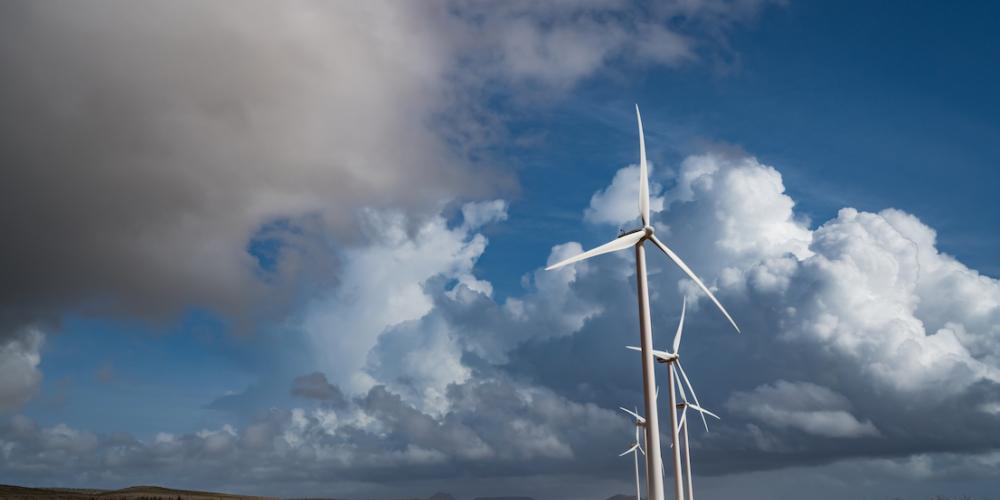
Since a few months, the South American nation of Suriname is the proud owner of a large hydropower plant after its owner - an American mining multinational - retreated from the country. This hydro plant gives Suriname a unique opportunity to kick off a green energy transition, as shown by a new study led by the Vrije Universiteit Brussel (VUB) and the KU Leuven, in collaboration with Suriname's utility company NVEBS. "Hydropower and wind power in Suriname are highly complementary, and could provide very reliable, green power when operated together. Suriname's new hydropower plant can react very fast whenever the wind subsides," says Sebastian Sterl, energy and climate expert at the VUB and lead author of the research. The study was published in the scientific journal Renewable and Sustainable Energy Reviews.
In the interior of Suriname lies the Afobaka dam with behind it the enormous Brokopondo lake. The hydropower plant was built in the 60's by the American mining multinational Alcoa, to generate electricity for an aluminum smelter. By the turn of the century, Alcoa also started to sell the power to Suriname at exorbitant prices. Since a few years, however, Alcoa has completely withdrawn its industrial activities from the country. Consequently, the hydropower plant was transferred to the Surinamese state at the end of 2019. "The dam is ours", the newspaper headlines said triumphantly.
Researchers from the Vrije Universiteit Brussel and KU Leuven, in collaboration with the N.V. Energiebedrijven Suriname (NVEBS), have now mapped out how Suriname could use its newly acquired dam to support a climate-friendly energy transition based on wind energy. "Modern forms of green power generation, such as wind and solar, are becoming cheaper and cheaper. But their power production always depends on the weather. The flexible deployment of hydropower plants is therefore valued more and more," says Sebastian Sterl. "The Afobaka power plant, too, could ideally serve to support wind power generation and thus make the power supply more reliable. After all, it can react very quickly when the wind subsides".
Even though Suriname is not an island, the country's power generation resembles typical Caribbean island states - with local, isolated power grids and no power line connections with neighboring countries. This complicates the transition to variable renewable power generation, such as with wind. In Europe, countries can import electricity from neighbouring countries in case of power shortages, and export in case of surpluses - in this way, Denmark has been able to become the global leader in wind power. But Suriname does not have such options. Like most Caribbean countries, it stands alone in the energy transition.
About 55% of Suriname's power supply currently comes from the Afobaka power plant. The rest is generated in polluting diesel power stations. "Not only does this cause a lot of CO2 emissions, but it also makes Suriname very vulnerable to fluctuations in oil and dollar prices on the world market. The trade winds, on the other hand, that blow along the Surinamese coast, cost us nothing," says Peter Donk, renewable energy expert at NVEBS. "If we were to use our dam to absorb variations in wind energy, we would come a long way.”
The research shows that Suriname could indeed take large steps for an energy transition if the operational scheme of the Afobaka power plant were adapted to the potential for wind power generation. In this way, large wind farms on the coast could easily be integrated into the country's largest electricity network, which supplies the capital Paramaribo and its surroundings. "The interesting part is that these two sources - hydropower and wind power - have an opposite seasonal cycle," explains Donk. "The reservoir fills up during the wet months, while the coastal winds blow hardest during the dry months. Hydropower and wind power in Suriname fit together like two pieces of a puzzle".
Shortages in wind power generation can therefore easily be compensated for by the hydropower plant. But what should Suriname do with surpluses when the wind blows hard for a long time and demand is low? The electricity network must remain stable, but exporting to neighboring countries is not possible. The researchers also have an answer to this: "Building and operating wind farms is becoming so cheap that you could simply switch off a selection of wind turbines temporarily. In the long run, wasting the surpluses in this way turns out to be cheaper than not building any wind turbines and running the diesel power stations instead," says Sterl.
All in all, Suriname could prevent about half of its current imports of fuel for the diesel power plants with wind energy. On average, wind turbines could cover around 25% of Suriname's electricity needs - together with the hydropower plant, power generation in Suriname would then be renewable at around 80%. In the dry season, the share of wind power could even increase to 50%. "Switching to flexible management of the Afobaka power plant in combination with the roll-out of wind power can therefore be an important step towards climate neutrality," says Prof. Wim Thiery, climate scientist at the VUB and co-author of the study. "This is an excellent opportunity for Suriname to contribute to the realisation of the Paris Agreement".
The study can also inspire other countries in the region to investigate similar strategies, Donk hopes. "Caribbean countries often have the same challenges with isolated power grids as Suriname, and several of them already have experience with hydropower. South American countries, such as Colombia and Ecuador, also have their own hydropower plants that can support renewable electricity production from wind or solar power. There is enormous potential in the region to benefit from this Surinamese knowledge," he concludes.
The study, entitled "Turbines of the Caribbean: Decarbonising Suriname's electricity mix through hydro-supported integration of wind power", was published in the journal Renewable and Sustainable Energy Reviews. https://authors.elsevier.com/sd/article/S1364-0321(20)30640-7